Overview
The article explores the effects of alcohol on diabetes risk, highlighting that alcohol consumption can disrupt blood sugar management and lead to both hypoglycemia and hyperglycemia, particularly for individuals with diabetes. It supports this by detailing the biological mechanisms involved, such as the impact of ethanol on gluconeogenesis and insulin sensitivity, as well as providing guidelines for moderate consumption to mitigate these risks.
Introduction
Navigating the complexities of diabetes management requires a nuanced understanding of various lifestyle factors, and alcohol consumption is no exception. For individuals living with diabetes, the relationship between alcohol and blood sugar levels can significantly impact health outcomes.
Alcohol affects metabolic processes, potentially leading to both hypoglycemia and hyperglycemia, making informed choices essential. This article delves into the mechanisms by which alcohol influences diabetes management, offers guidelines for safe consumption, and highlights the importance of self-monitoring.
By understanding these dynamics, individuals can make educated decisions that support their overall health and well-being.
The Connection Between Alcohol and Diabetes: Mechanisms and Impacts
Welcome to T2DSolutions, a new resource hub dedicated to Type 2 and Type 3 health education and community support, brought to you by the T2DSolutions Content Team. As we launch, we invite newly diagnosed patients to subscribe for updates and valuable information about our upcoming content. Comprehending beverage intake is essential for effectively managing blood sugar levels.
Alcohol can profoundly influence blood sugar management, which is important to consider due to the alcohol diabetes risk through various biological mechanisms. Upon ingestion, ethanol is primarily metabolized in the liver, disrupting gluconeogenesis—the metabolic pathway responsible for producing glucose. This disruption can lead to hypoglycemia, especially for individuals with diabetes on insulin or other glucose-lowering medications.
Furthermore, beverages containing ethanol contribute to alcohol diabetes risk by impairing insulin sensitivity and complicating the body’s ability to utilize glucose efficiently. Recent studies suggest that moderate intake of spirits may have a protective effect against cardiovascular disease, especially for those taking between 0.1 to 34 grams of the substance daily. However, caution is critical, as only 3% of study participants reported consuming more than one drink per day, emphasizing the need for moderation.
The caloric content of alcoholic drinks can lead to weight gain, which complicates blood sugar management and contributes to alcohol diabetes risk. Thus, individuals must make informed decisions regarding drink consumption, considering beverage type, quantity, and timing relative to meals and medications. Case studies demonstrate that self-reporting can affect perceived risks, reinforcing a U-shaped relationship between alcohol consumption and the risk of developing certain health conditions.
Regular blood glucose monitoring after eating is advisable to mitigate adverse effects and promote better management of the condition. As Dolly O Baliunas aptly stated, 'Alcohol intake in men and women should thus be limited to moderate amounts, and heavy usage should be discouraged.' Understanding these dynamics empowers individuals with blood sugar issues to navigate their condition more effectively, especially considering the alcohol diabetes risk and the statistical significance with a threshold of <0.05 in bidirectional tests.
Stay tuned for more insights and community support at T2 Solutions.
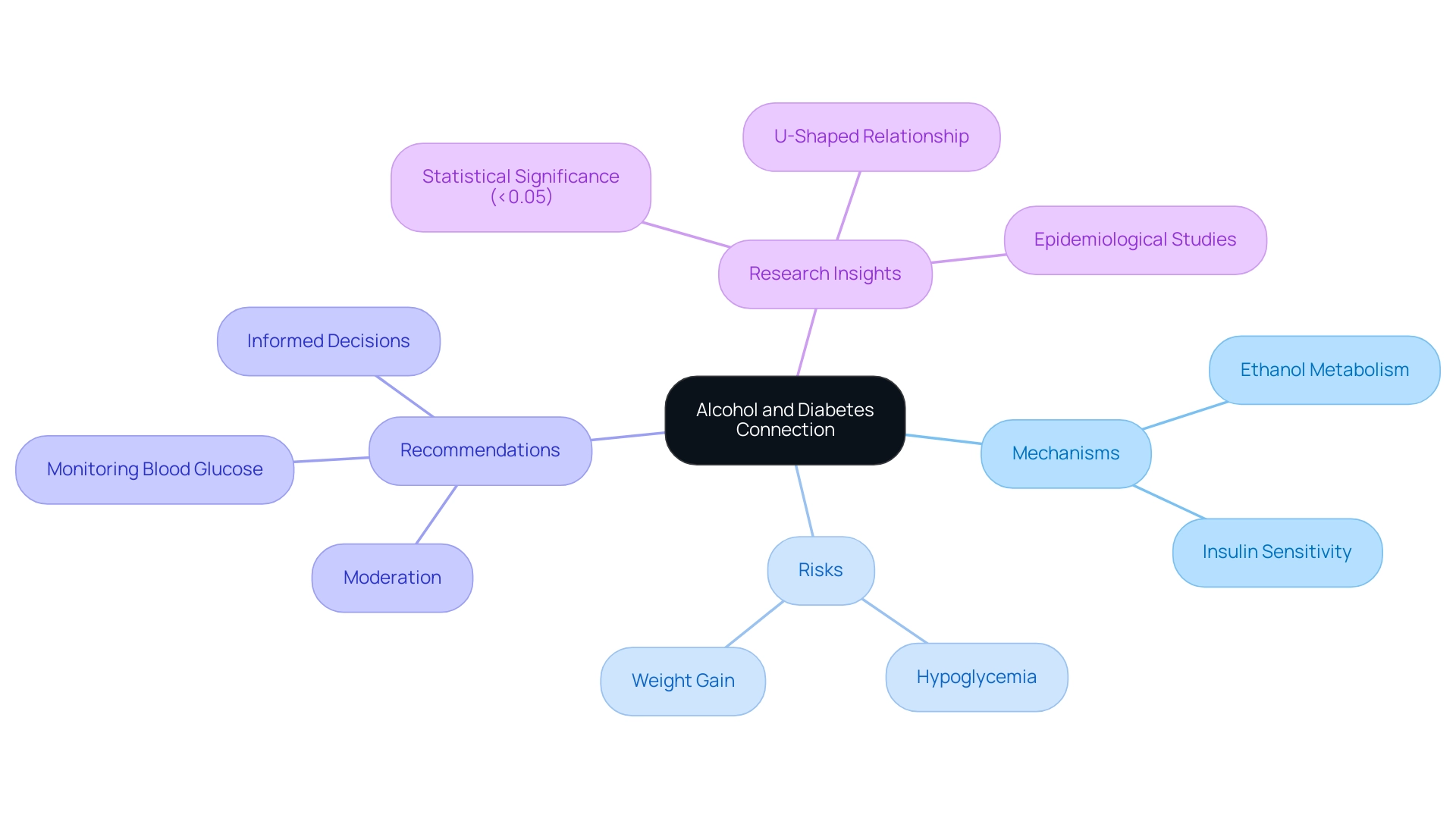
Recommended Guidelines for Alcohol Consumption in Diabetic Patients
As T2DSolutions begins as a new resource center for education and support related to blood sugar management, it is essential for individuals handling this condition to follow specific guidelines concerning beverage intake to reduce potential health risks. As per the Heart Outcomes Prevention Evaluation (HOPE) study, which included 9,297 people aged ≥55 years with a background of vascular disease or blood sugar issues, moderation in drinking is especially crucial for individuals with cardiovascular risk factors. Key recommendations include:
- Consulting with Healthcare Providers: Engaging in discussions with your healthcare team about beverage consumption is essential to understand its impact on diabetes management and personal health.
- Moderation is Key: It is advisable to limit alcohol intake, generally to one drink per day for women and up to two drinks per day for men, to mitigate alcohol diabetes risk.
This moderation helps mitigate any adverse effects on glucose levels, thereby reducing alcohol diabetes risk. - Choose Wisely: Selecting low-sugar options, such as light beers or spirits combined with non-caloric mixers, can help avoid unnecessary spikes in glucose levels.
The case study on non-nutritive sweeteners highlights their effectiveness in not raising glucose levels, underscoring the importance of overall dietary quality. - Never Drink on an Empty Stomach: Consuming food alongside beverages is essential to stabilize sugar levels and prevent fluctuations that could lead to complications.
- Monitor Glucose Levels: Regularly checking sugar levels before and after consuming beverages provides insights into individual responses, enabling better management decisions.
- Avoid Binge Drinking: Limiting excessive drinking is critical, as binge drinking can lead to significant blood sugar fluctuations and raise the alcohol diabetes risk, especially hypoglycemia, which is defined as a blood glucose level of 70 mg/dL or lower. Immediate treatment with glucose is necessary if hypoglycemic symptoms, such as anxiety and irritability, arise.
Adhering to these recommendations can aid in efficient control of blood sugar levels while permitting occasional intake of spirits.
T2DSolutions is dedicated to offering continuous assistance and resources for individuals with the condition, including information on managing alcohol intake. The American Diabetes Association recommends that individuals with the condition consider an eating plan emphasizing elements of a Mediterranean eating pattern, which is rich in monounsaturated and polyunsaturated fats and long-chain fatty acids, to further reduce cardiovascular disease risk and improve glucose metabolism.
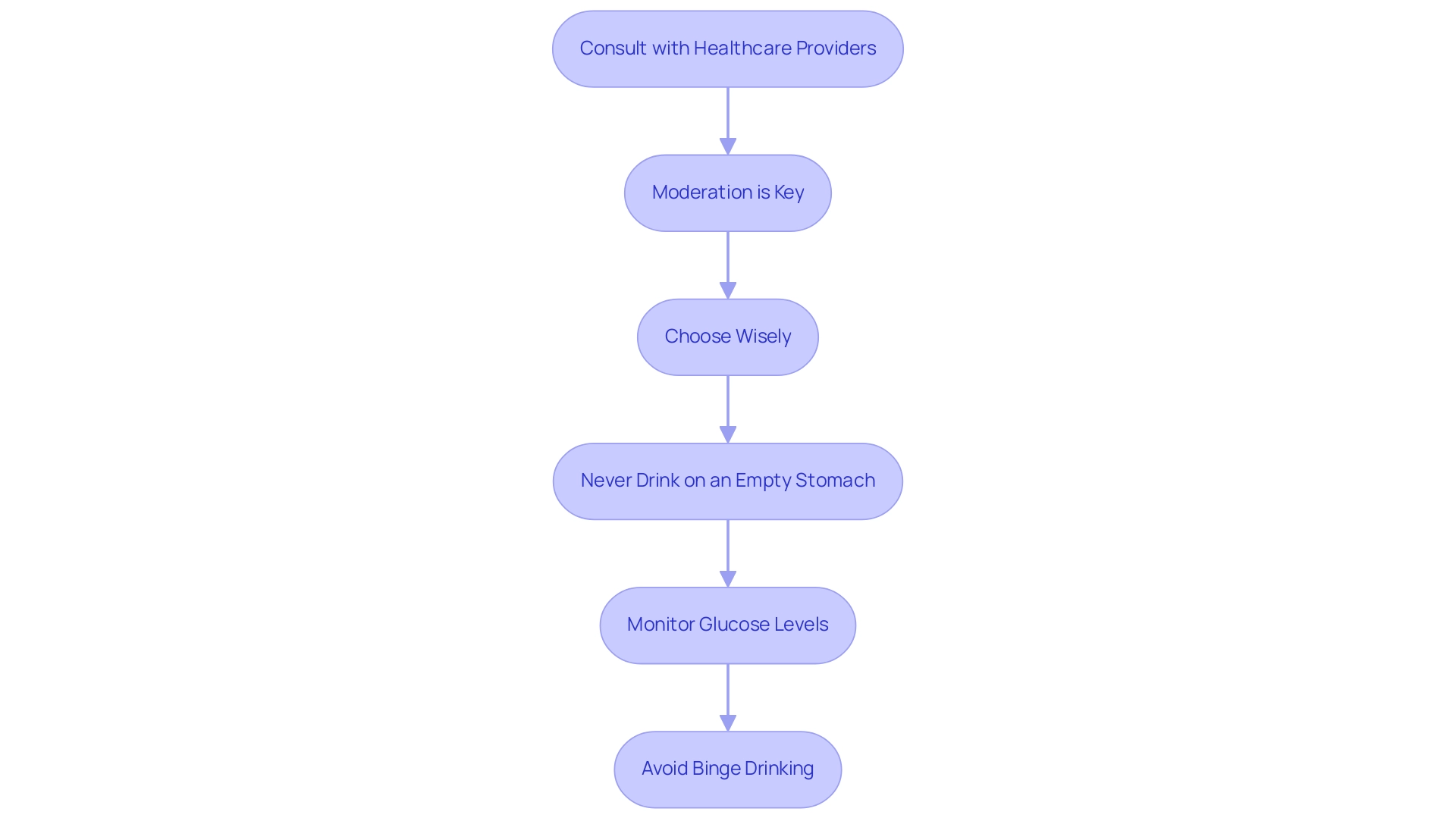
Understanding Alcohol's Effects on Blood Sugar Levels
As T2DSolutions prepares to launch as a comprehensive resource hub for Type 2 and Type 3 education and community support, it is crucial for individuals managing their health to understand the effects of different alcoholic beverages on their alcohol diabetes risk. For instance, a heavy drinking day, defined as 5 or more drinks for men and 4 or more drinks for women, can elevate the alcohol diabetes risk and have serious implications for diabetes management. Beer typically contains carbohydrates that can raise sugar levels, highlighting the alcohol diabetes risk and necessitating careful consideration when calculating insulin doses.
In contrast, sweet wines often have higher sugar content, potentially increasing the alcohol diabetes risk by causing spikes in glucose levels. On the other hand, spirits typically have lower carbohydrate levels; however, when mixed with sugary mixers, they can substantially elevate sugar levels, which increases the alcohol diabetes risk. Dry wines, characterized by their lower sugar content, generally exert a milder effect on blood sugar, potentially lowering the alcohol diabetes risk compared to their sweeter counterparts.
As Dr. Lorenzo Leggio, M.D., M.Sc., states, 'These results suggest that elevated glucose and heavy drinking may be influenced by a shared mechanism, and manipulations affecting glucose regulation may impact beverage intake, which is relevant to the alcohol diabetes risk.' T2DSolutions will offer guides, articles, and community discussions to assist individuals with managing their condition, facilitating informed choices related to beverage intake and improving their management strategies.
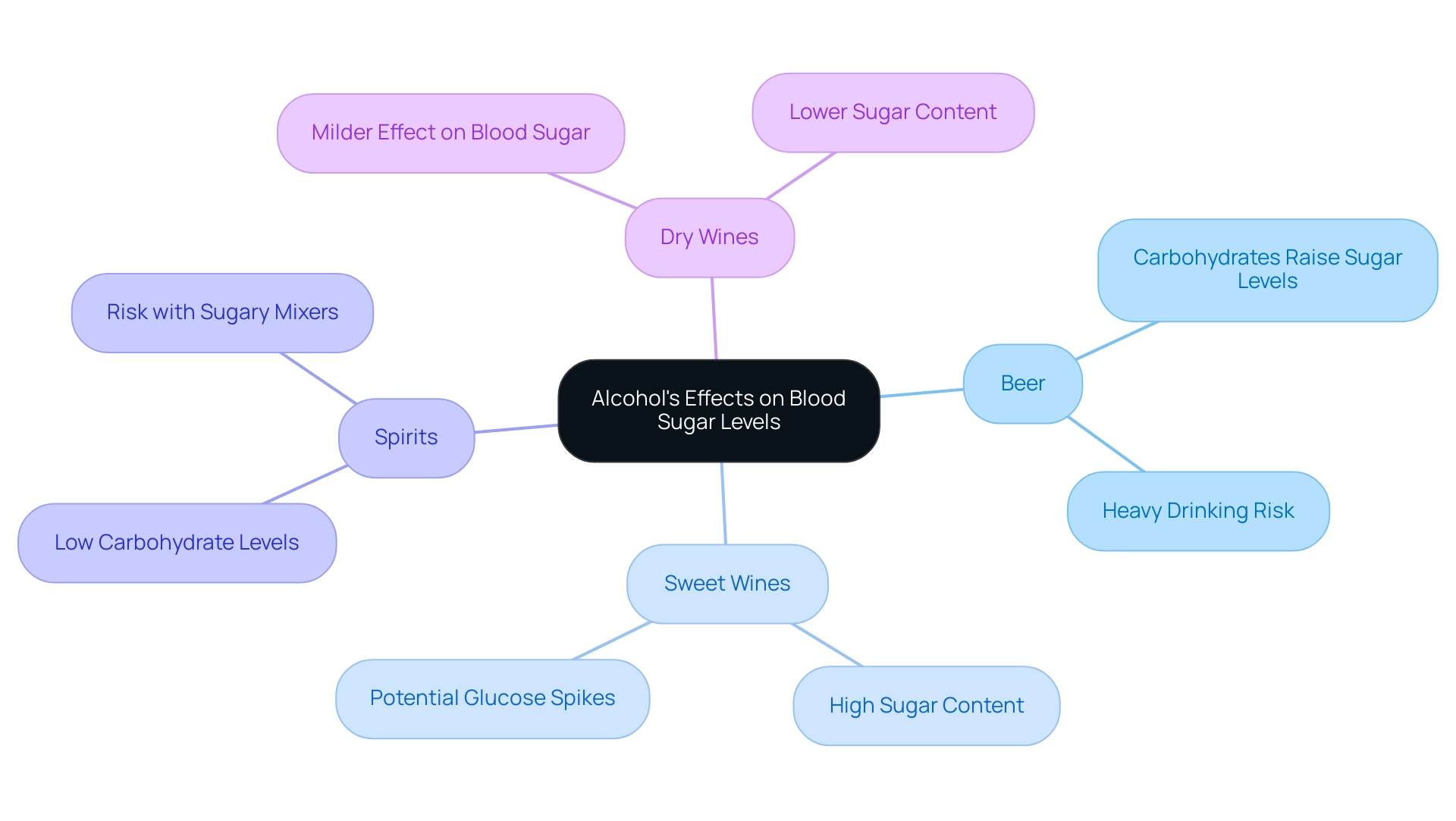
The Importance of Self-Monitoring After Alcohol Consumption
As T2DSolutions initiates as a new resource center for Type 2 and Type 3 blood sugar education and community assistance, it is vital to address the alcohol diabetes risk in the management of these conditions. Alcohol can significantly affect sugar levels, highlighting the alcohol diabetes risk and making self-monitoring after consumption crucial for individuals managing diabetes to mitigate potential adverse effects. It is recommended to follow these guidelines:
-
Check Glucose Levels: Measure your glucose before drinking, one hour after, and again two hours post-consumption to monitor any fluctuations effectively.
-
Recognize Symptoms of Hypoglycemia: Be vigilant for signs such as dizziness, sweating, confusion, and shakiness, which can indicate low sugar levels.
-
Have a Plan: Always keep a quick source of glucose readily available, such as glucose tablets or juice, to address hypoglycemia promptly.
-
Adjust Insulin Doses if Necessary: Based on your monitoring outcomes, consult with your healthcare provider to determine if insulin doses need adjustment to maintain stable sugar levels.
-
Keep a Log: Record your blood sugar readings alongside your beverage intake. This practice assists in recognizing patterns over time and allows you and your healthcare team to enhance your management plan effectively.
It is crucial to recognize that additional research is necessary to investigate how physician advice influences alcohol consumption and self-care adherence. Notably, a statistic shows that the registry was 99.5% sensitive for diagnosed diabetes compared with survey-derived self-report in January 2003, underscoring the importance of accurate monitoring.
Additionally, a study by Henderson et al. (1987) found that the glycaemic response to various types of beer was directly related to their carbohydrate content. This emphasizes the significance of understanding specific alcoholic drinks and their impacts on the alcohol diabetes risk.
As Lorenzo Leggio, M.D., M.Sc., emphasizes, "the present study also showed that pre-treatment blood glucose level significantly correlated with the first eight weeks of during-treatment PHDD." This highlights the importance of strict self-monitoring methods after drinking.
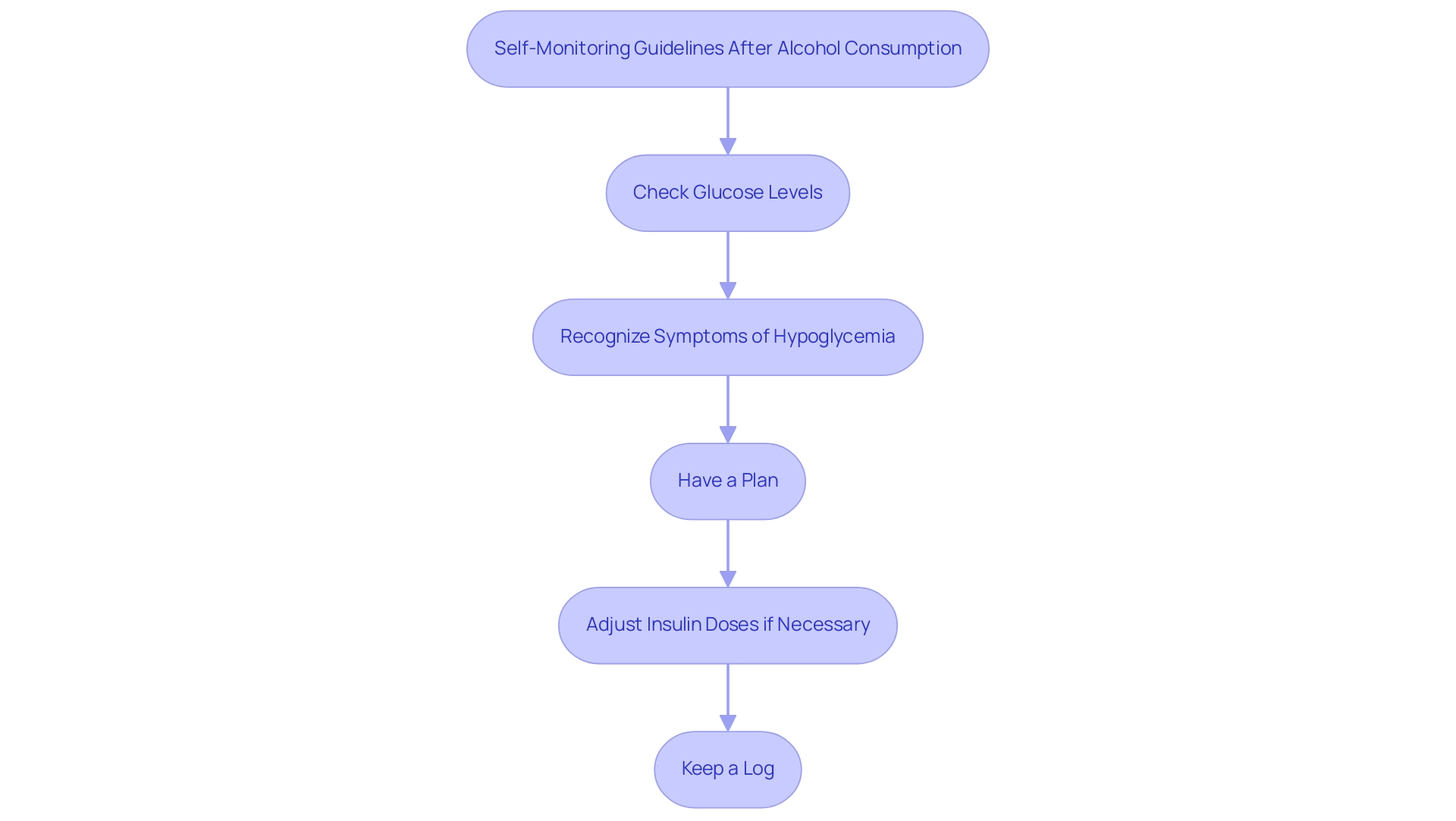
Potential Risks and Complications of Alcohol Consumption
T2DSolutions is your new resource hub for health education and community support. As we begin, we intend to offer valuable insights into managing the condition effectively, including the alcohol diabetes risk associated with alcohol use. Individuals managing their condition must carefully consider the alcohol diabetes risk associated with alcohol consumption.
These risks include:
- Hypoglycemia: Alcohol can significantly reduce sugar levels, especially when taken with medications for blood sugar regulation, resulting in potentially hazardous hypoglycemic incidents.
- Hyperglycemia: Certain alcoholic beverages, notably sweet wines and mixed cocktails, can cause elevated sugar levels, complicating glucose management and overall control of diabetes.
- Weight Gain: The caloric density of alcoholic beverages can contribute to weight gain, a common concern among diabetics, further complicating effective management and increasing the risk of related complications.
- Interactions with Medications: Alcohol may interfere with the efficacy of glucose-lowering medications, resulting in unpredictable fluctuations in blood glucose levels, which can pose significant health risks.
- Liver Damage: Prolonged consumption of alcoholic beverages may cause liver dysfunction, a significant issue for individuals with high blood sugar who already encounter an increased risk of liver-related complications.
Considering these dangers, those with high blood sugar are recommended to refrain from excessive drinking, as it can lead to ketoacidosis, hypertriglyceridemia, and an increased alcohol diabetes risk, heightening the chance of death from non-cardiovascular factors. Comprehending these dangers is crucial for making knowledgeable choices about drinking and for effectively managing the alcohol diabetes risk. A prospective analysis involving 12,042 study participants demonstrated that 3,795 individuals developed high blood sugar over a median follow-up period of 21 years, highlighting the importance of addressing lifestyle factors, including beverage consumption.
The results indicate that high intake of spirits can worsen management difficulties related to the condition, highlighting the importance of caution and awareness among individuals diagnosed with it. Kohner et al. observed that the connection between beverage intake and retinopathy was not independent, emphasizing the intricate interaction between drink use and diabetes-related complications.
Furthermore, a meta-analysis indicated that moderate intake of beverages may not provide a decrease in metabolic risk, especially among men, highlighting a necessity for additional study on sex-specific variations and the influence of beverage intake patterns on type 2 blood sugar risk. Therefore, it is imperative for individuals with blood sugar issues to evaluate their alcohol consumption habits due to the alcohol diabetes risk and its potential health implications. T2DSolutions aims to be your comprehensive resource for Type 2 and Type 3 diabetes education and community support, ensuring that you have access to crucial information as you navigate your health journey.
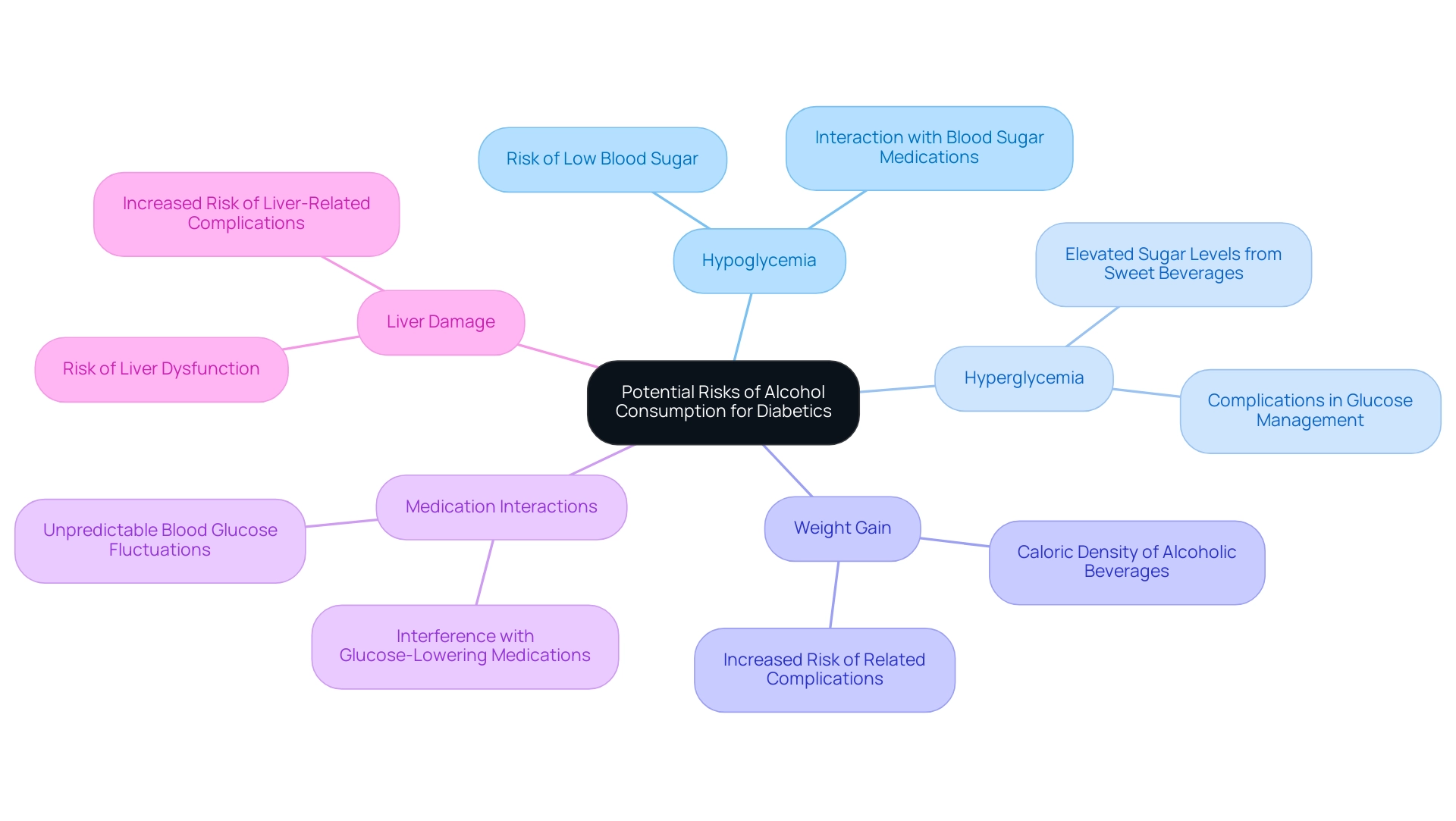
Conclusion
Understanding the interplay between alcohol consumption and diabetes management is essential for individuals living with this condition. Alcohol can disrupt metabolic processes, leading to both hypoglycemia and hyperglycemia, which underscores the importance of moderation and informed choices. The guidelines provided emphasize:
- Consulting healthcare providers
- Monitoring blood sugar levels
- Being mindful of the type and amount of alcohol consumed
Self-monitoring plays a critical role in managing the potential risks associated with alcohol. Regularly checking blood glucose levels before and after drinking can help individuals understand their unique responses and adjust their management strategies accordingly. Additionally, recognizing the signs of hypoglycemia and having a plan in place are vital for maintaining stability in blood sugar levels.
Ultimately, while moderate alcohol consumption may offer certain benefits, the potential risks cannot be overlooked. Individuals with diabetes should approach alcohol with caution, ensuring that their choices support their overall health and diabetes management goals. By adhering to established guidelines and prioritizing self-monitoring, individuals can navigate their relationship with alcohol more effectively, ultimately enhancing their quality of life.



